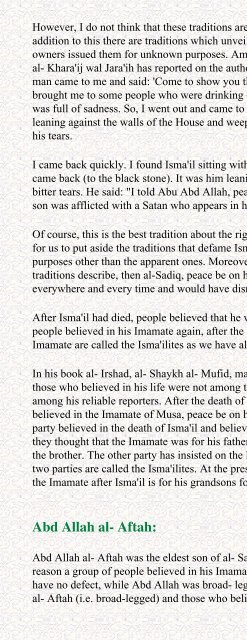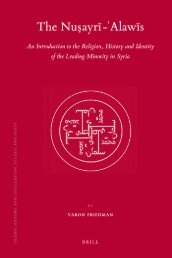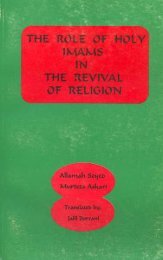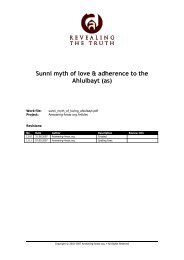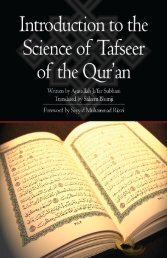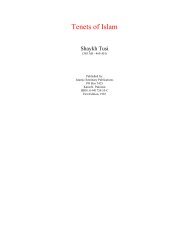Imam Al-Sadiq
Imam al-Sadiq - UMAA | Library
Imam al-Sadiq - UMAA | Library
- No tags were found...
You also want an ePaper? Increase the reach of your titles
YUMPU automatically turns print PDFs into web optimized ePapers that Google loves.
However, I do not think that these traditions are as equal as those which praise him. In<br />
addition to this there are traditions which unveil the defaming traditions and denote that their<br />
owners issued them for unknown purposes. Among such traditions is that which the author of<br />
al- Khara'ij wal Jara'ih has reported on the authority of al- Walid b. Sabih.(540) who said: "A<br />
man came to me and said: 'Come to show you the son of your Lord'. I went with him. He<br />
brought me to some people who were drinking (wine). Among them was Isma'il b. Ja'far. I<br />
was full of sadness. So, I went out and came to the black stone. Suddenly, I found Isma'il<br />
leaning against the walls of the House and weeping. He wetted the walls of the Kaaba with<br />
his tears.<br />
I came back quickly. I found Isma'il sitting with those people (who were drinking wine). I<br />
came back (to the black stone). It was him leaning against the walls of the Kaaba and weeping<br />
bitter tears. He said: "I told Abu Abd <strong>Al</strong>lah, peace be upon, about that.' He said: "Indeed, my<br />
son was afflicted with a Satan who appears in his shape.'"<br />
Of course, this is the best tradition about the righteousness of Isma'il. Therefore, it is better<br />
for us to put aside the traditions that defame Isma'il or we must explain that they have<br />
purposes other than the apparent ones. Moreover, if Isma'il had been as the defaming<br />
traditions describe, then al-<strong>Sadiq</strong>, peace be on him, would have not accompanied him<br />
everywhere and every time and would have dismissed him as he dismissed his son Abd <strong>Al</strong>lah.<br />
After Isma'il had died, people believed that he was not the <strong>Imam</strong> after his father. But some<br />
people believed in his <strong>Imam</strong>ate again, after the death of his father. Those who believed in his<br />
<strong>Imam</strong>ate are called the Isma'ilites as we have already mentioned.<br />
In his book al- Irshad, al- Shaykh al- Mufid, may <strong>Al</strong>lah rest him in peace, has mentioned that<br />
those who believed in his life were not among the followers of his father nor did they were<br />
among his reliable reporters. After the death of al- <strong>Sadiq</strong>, peace be on him, some of them<br />
believed in the <strong>Imam</strong>ate of Musa, peace be on him. And the rest became two parties- one<br />
party believed in the death of Isma'il and believed in the <strong>Imam</strong>ate of his son Mohammed, for<br />
they thought that the <strong>Imam</strong>ate was for his father, so the son is worthier of the <strong>Imam</strong>ate than<br />
the brother. The other party has insisted on the life of Isma'il. Today they are very few. These<br />
two parties are called the Isma'ilites. At the present time, we know only those who claim that<br />
the <strong>Imam</strong>ate after Isma'il is for his grandsons forever.<br />
Abd <strong>Al</strong>lah al- Aftah:<br />
Abd <strong>Al</strong>lah al- Aftah was the eldest son of al- <strong>Sadiq</strong>, peace be on him, after Isma'il. For this<br />
reason a group of people believed in his <strong>Imam</strong>ate, but they forgot that the eldest son should<br />
have no defect, while Abd <strong>Al</strong>lah was broad- legged (aftah al- rijlayn). So, people called him<br />
al- Aftah (i.e. broad-legged) and those who believed in his <strong>Imam</strong>ate were called the Aftahiya.


